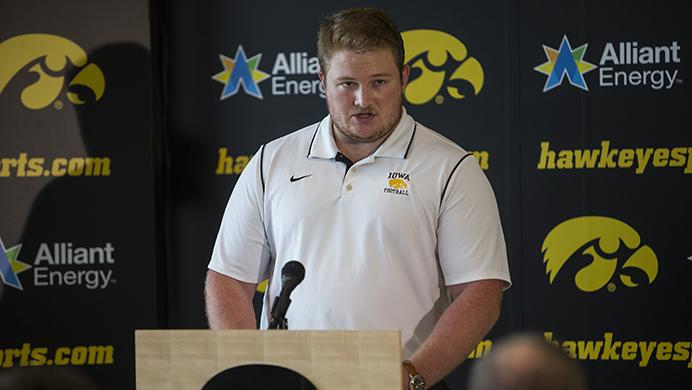Iowa offensive lineman Sean Welsh opens up about his recent struggles with depression and encourages others who struggle to seek help.
By Jordan Zuniga
If people were to attempt to create a perfect college football player, they would find it hard to make one better than Iowa’s Sean Welsh.
From the outside looking in, he seems to be living the life most kids only dream about. But, as the age-old saying goes, things aren’t always as they seem.
For the past three years, Welsh has been a starting offensive lineman for the Hawkeye football team, a role in which he has excelled.
In his three years at Iowa, Welsh has been honored numerous times and recently was named to the Outland Trophy Watch List for this upcoming season.
Even in the classroom, Welsh has been the blueprint for all student-athletes — last year, he was honored by being named Academic All-Big Ten.
But on Wednesday, the 6-3 lineman announced in a press conference that he has struggled with depression throughout his time at Iowa.
“No game or season has ever tested my endurance or attacked my resolve like the challenge that I now face each day of my life: depression,” Welsh said. “The simple truth is that it doesn’t matter if it’s on the football field, in the classroom, or in a corporate office — success doesn’t immunize you from depression.”
RELATED: My toughest opponent: Depression
Welsh said he began to show symptoms of depression throughout the 2014 season, but he hit his low in the spring of 2015.
“The week before spring break 2015, the wheels really came off,” Welsh said. “I forgot about classes, missed a midterm, and barely survived workout. It quickly became a downward spiral. I remember a stretch when I didn’t leave my room for three days.
“I hit the eject button, told Coach Kirk Ferentz I wouldn’t be able to be with the team that spring, and left early to go home.”
The decision blind-sided Ferentz, who, for the first time in his career, had to deal with a player struggling with a serious case of depression.
“You see a player like Sean out in the field doing so well and doing so many good things in the classroom, you just never know what’s under the surface,” Ferentz said. “What Sean has done is so, so commendable to watch him take this challenge straight-on over the last couple of years, and I think even more commendable is he wants to share this story, because it’s certainly not uncommon for athletes to go through this. For people of all ages, it’s a very real thing.”

Welsh began to see a therapist more and started taking medication in the spring of 2015.
Since then, things haven’t been perfect for Welsh, but he now has ways of coping with his symptoms, along with the support of his teammates.
Jess Fiedorowicz, a UI associate professor of psychiatry, said that with professional help, depression is a treatable condition.
“About 50 percent of individuals who have one episode [of depression] will go on to have another, but that means there’s another 50 percent who will have that as their only episode,” Fiedorowicz said.
Fiedorowicz and Welsh stressed that the biggest step in treating depression is realizing the need for professional help and the support of family and friends.
“If you think you suffer from depression, see someone,” Welsh said. “If you suspect a loved one suffers, get them the help they need. And if you know of someone struggling with depression be understanding and caring; you will make a world of difference.”



